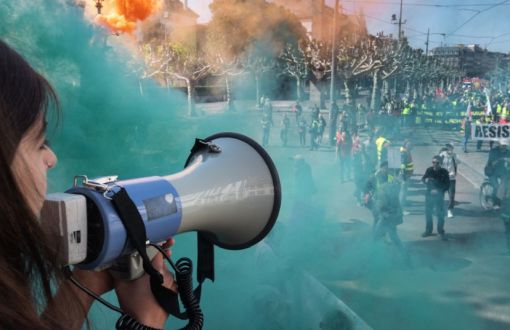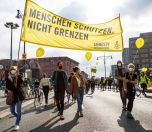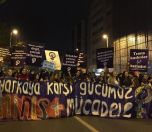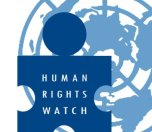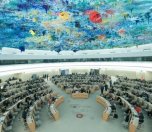* Photo: From Amnesty International report / AFP
Click to read the article in Turkish
Amnesty International released its annual report reviewing the situation of human rights across the world in 2019 today (April 29).
While Turkey is evaluated under the chapter "Human Rights in Europe," Amnesty has made the following general commentary on the continent:
"In 2019 in the heart of Europe, some states actively sought to erode the independence of the judiciary to avoid state accountability.
"The EU continued to outsource border and migration control. Grave human rights risks ensued: tens of thousands of people remained exposed to conflict, violence, torture and an uncertain future in destitute conditions.
"Those opposing these border and migration control policies frequently faced smear campaigns, harassment, and even administrative and criminal penalties. Increasing numbers of human rights defenders, activists and independent media faced intimidation and prosecution."
'Crackdown on real, perceived dissent continued'
Specifically reviewing the situation of human rights and freedoms in Turkey last year, the organization has shared the following general observations:
"The crackdown on real or perceived dissent continued in 2019, despite the end of the two-year-long state of emergency in July 2018.
"Thousands of people were held in lengthy and punitive pre-trial detention, often without any credible evidence of their having committed any crime recognizable under international law.
"There were severe restrictions on the rights to freedom of expression and peaceful assembly and people considered critical of the current government – in particular journalists, political activists and human rights defenders – were detained or faced trumped-up criminal charges.
"The authorities continued to arbitrarily ban demonstrations and use unnecessary and excessive force to disperse peaceful protestors.
"There were credible reports of torture and enforced disappearances. Turkey forcibly returned Syrian refugees, while continuing to host more refugees than any other country."
'Reforms failed to address structural flaws in judiciary'
The report has also touched upon the recently enacted law on criminal enforcement. "In the last quarter of the year, a judicial reform package was passed by Parliament," the report has reminded and added:
"The reforms failed to address the structural flaws in a judiciary under extreme political pressure or to end unfair and politically motivated prosecutions and convictions."
Other highlights from the report are as follows:
'Punitive pretrial detention used to silence dissent'
"Criminal investigations and prosecutions under anti-terrorism laws and punitive pre-trial detention continued to be used, in the absence of evidence of any criminal wrongdoing, to silence real or perceived dissent.
"The courts blocked online content and criminal investigations were launched against hundreds of social media users.
"In August, a new regulation came into effect that requires internet broadcasting platforms to apply for licenses to the Radio and Television Supreme Council (RTÜK). The content of the platforms will be monitored by the RTÜK, expanding its censorship powers over online content.
"At least 839 social media accounts were investigated for allegedly "sharing criminal content" related to "Operation Peace Spring". Hundreds of people were detained and at least 24 were remanded in pre-trial detention.
'Peaceful journalistic work cited as criminal evidence'
"Dozens of journalists and other media workers remained in prison either in pre-trial detention or serving a custodial sentence.
"Some of those investigated and prosecuted under anti-terrorism laws were convicted and sentenced to years of imprisonment; their peaceful journalistic work presented as evidence of a criminal offence.
Pressure on rights defenders, politicians
"Dozens of human rights defenders faced criminal investigations and prosecutions and held in custody or imprisoned for their human rights work.
"The trial of the 11 human rights defenders in the Büyükada case, including the former chair, ex-director and several members of Amnesty Turkey as well as women's and equality advocates continued in 2019 on baseless charges of "membership of a terrorist organization".
"On 10 December, the European Court of Human Rights ruled that Osman Kavala's extended pre-trial detention lacked reasonable suspicion and was carried out with the ulterior purpose of reducing him to silence, calling for his immediate release. By the end of the year, he had been held in Silivri high security prison for over two years.
"Human rights lawyer Eren Keskin remained at risk of imprisonment as a result of over 140 separate prosecutions for her past role as symbolic editor-in-chief of the now closed Kurdish daily newspaper Özgür Gündem.
"In September, food engineer and dismissed academic Dr Bülent Şık was convicted of "disclosing classified information" and sentenced to 15 months' imprisonment for a series of articles exposing the presence of carcinogenic pesticides and other toxins in agricultural products and water. His appeal against the conviction was pending at the end of the year.
"Two former co-chairs of the Peoples' Democratic Party (HDP), Selahattin Demirtas and Figen Yüksekdağ, remained imprisoned, convicted of terrorism-related charges which, in the absence of credible evidence, were largely based on their public speeches.
"In September, Istanbul Provincial Chairperson of the main opposition Republican People's Party (CHP), Canan Kaftancıoğlu, was sentenced to nine years and eight months in prison for "insulting the President", "insulting a public official because of his/her duty", "provoking people into enmity and hatred" and "propaganda for a terrorist organization." (AS/SD)




